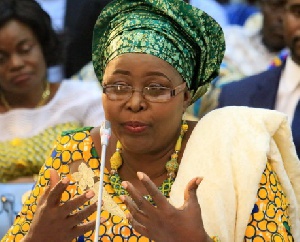 Hajia Alima Mahama, the Minister for Local Government and Rural Development
Hajia Alima Mahama, the Minister for Local Government and Rural Development
Hajia Alima Mahama, the Minister for Local Government and Rural Development, has stated that allowing citizens to elect their local leaders in Ghana is long overdue after 30 years of local government practice.
She noted that the election of Metropolitan, Municipal and District Chief Executives (MMDCEs) as tabled by government was in line with contemporary global best practices in local governance which Ghana must aspire to add to its enviable democracy credentials.
Hajia Alima stated this in Wa, during a sensitisation and awareness raising workshop on the election of MMDCEs.
The regional workshop seeks to provide information to stakeholders on the issue and to rally their support towards the local election.
The process is projected to promote local democracy by creating the opportunity for local people to choose their own leaders in the various assemblies.
“If the people can choose their leaders at the national level why can’t they do same at the local level,” she quizzed.
Voting MMDCEs would make them more responsive and directly accountable to the local people who elected them into power, she added.
It would also ensure the security of tenure of MMDCEs, douse tension associated with appointment by the President, remove winner-take-all syndrome and ensure inclusive participation.
Participation at the district level elections currently has a lower national percentage of 30 – 40, which Hajia Alima said was also likely to increase to match that of the 75 – 85 percent pertaining in national elections.
She said government was committed to the process, hence the initiation of the process to bring about the necessary constitutional, legal, policy and institutional changes to ensure that MMDCEs were elected on partisan basis.
The Constitutional Review Committee (CRC), the Afro Barometer Survey and the National Commission for Civic Education (NCCE) have identified the mode of appointing MMDCEs as a governance gap in Ghana’s local governance system.
Alhaji Sulemana Alhassan, the Upper West Regional Minister, praised the Ministry for committing to push the MMDCEs election agenda in a move to deepening the country’s local governance system.
He was of the view the workshops would further enrich the discourse and create the needed level of understanding before the implementation process.
Participants were urged to fully participate in the training and bring out suggestions to shape the election process.
Dr. Eric Oduro Osae, Technical Advisor, Ministry of Local Government and Rural Development, said the power to elect MMDCEs had robbed off citizens since 1988 and that it was time for citizens to take control in deciding their local leaders.
He argued that election of MMDCEs would make Unit Committees more functional than before and also offload the work of Public Relations and Complaints Committee at the Assembly, saying: “If we support this, local democracy will grow”.
Mr Gabriel Dari, Associate Director at Centre for Local Governance Advocacy, also said the devolution of power was the seal for good local governance and urged stakeholders to support the process.